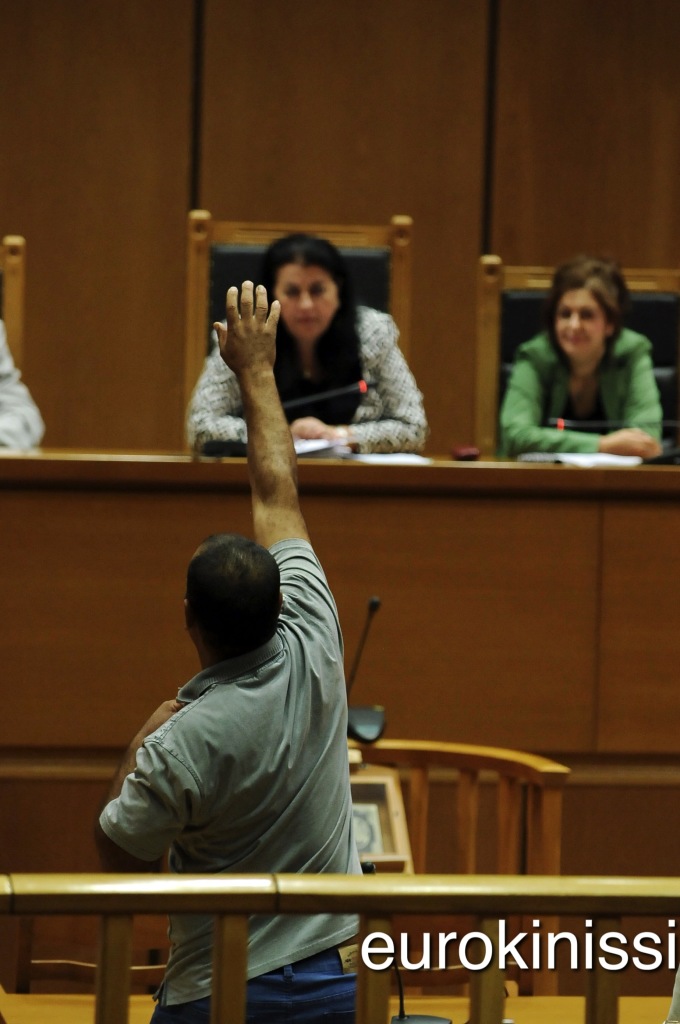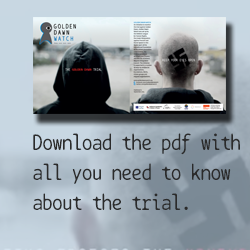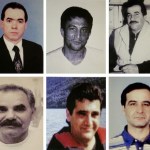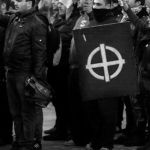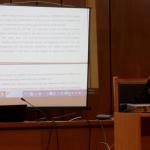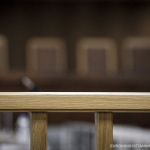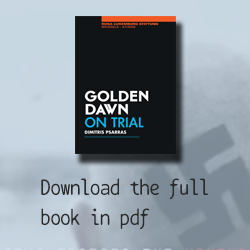83rd Hearing, Court of Appeals, September 9th, 2016
1. Access to the Court
The courtroom remains open to the public upon presentation of a state ID card, which is retained by court authorities for the duration of the session. There was significant attendance by the public and members of the press.
2. Presence and representation of the defendants
Present at the start of the proceedings were two defendants: Komianos and Skalkos. Thirty-six (36) defendants were recorded as absent and the rest were represented by their counsels.
3. Proceedings – Examination of requests – Witness testimony of Abouzide Embarak
Before the start of witness testimony of plaintiff Embarak, the civil action counsels submitted a motion for the personal appearance of five defendants in the case of the Egyptian fishermen (Agriogiannis, Pantazis, Evgenikos, Papadopoulos, and Marias). The state prosecutor reserved her judgment until the end of the hearing, since the witness hasn’t yet identified anyone in his testimonies. After a few clarifications concerning the names and the order of examination of the witnesses on the witness list, the civil action counsels informed the court that due to an important Muslim religious festival, two of the brothers Abou Hamed, at whose house the attack took place, were at the moment abroad. The defense counsel for Marias stated that the order of calling the witnesses on the list is helpful to the civil action counsels, because number 29 hasn’t identified the defendants.
At that point Embarak came to the stand, the victim of the attack that took place in the early hours of June 12th, 2012. The interpreter took the oath and the plaintiff stated that he would prefer to testify seated because he wasn’t feeling well. Responding to questions by the presiding judge he answered that he’s been living in Greece for 5 years away from his family, which includes his wife and five children, three of which he had before he came to Greece, and another two he fathered after the attack. Laughter was heard from the defense counsels and the presiding judge restored them to order by saying “this isn’t the theatre”. The witness continued with his testimony. He stated that he wasn’t employed in the period leading up to the attack, and that he was staying temporarily at Ahmed’s house. A year and a half after he came to Greece he found work in a fish factory, but he quit because he couldn’t stand the cold due to the health problems he was facing.
He proceeded to describe the attack on his person at about 23:30 while he was sleeping on the roof of the house, because it was too hot. He couldn’t pinpoint the time of the attack. He was wrapped in the blanket and he felt 2-3 quick hits on his knees and so he uncovered his face. He saw about 15-17 people on the roof, all dressed in black. 4-5 of them were hitting him, one of them with a steel crowbar, three of them with wooden beams, and the last one with his feet. The one holding the crowbar hit him on the face and on the leg. He didn’t know how they got up on the roof, since there are two ways to access it. There’s a staircase at the back, on the side of the house that faces the mountain. He perceived them only when they attacked him. He wasn’t in any condition to identify them, neither to remember whether there was a woman among the perpetrators, because it was dark, and little light was coming from the neighbors’ houses. Only Ahmed could identify them, because he saw them. Their hits landed all over his body. At some point he heard someone say “let’s go” [:“pame”], when they thought he was dead. It was one of the few Greek words that he knew at the time. He woke up in the hospital. He had fractures in various parts of his body, broken teeth, and needed 12 stitches. He stayed in the hospital for 17-18 days. He was eating through a straw for the next 33 days, because he underwent surgery to put in metal implants in his lower jaw. He experienced abdominal pains for about 6-7 months after the attack, because his liver was damaged from the blows, and he feels that he has trouble concentrating because of the attack.
Responding to the question by the presiding judge, whether he has worked after the attack, Embarak testified that the condition of his health forces him to quit after a few days, and that his family sold a plot of land in Egypt, to support him financially.
Referring to the perpetrators, he said that he knew none of them, and that he had no differences with anyone in Perama, because he knew no one there. However, he reported that he later learned that the perpetrators had previously threatened Ahmed and his brothers. At this point the defense counsel for Michaloliakos intervened to comment sharply on the interpreter, and tensions escalated in the courtroom, since a police officer tried to eject from the defense counsels’ section an arab-speaking companion of the aforementioned defense counsel. Objections were also raised by the civil action counsels, but the presiding judge allowed him [:the arab-speaking companion of defense counsel Michaloliakos] to remain in his seat.
The state prosecutor then observed that Embarak had mentioned in his hearing testimony certain details that were missing from his preliminary testimony. More specifically she said that in his prior testimonies he said he knew only five words, and that after the hits he sustained he remembered nothing else, now he stated that he knew 15 words, and he remembered that the perpetrators said “let’s go”. The plaintiff insisted that he testified everything that happened.
Responding to questions by the deputy prosecutor, Embarak mentioned that those that weren’t holding crowbars or wooden beams were hitting him with kicks and punches and that they behaved as if they had come to slaughter him. He supported that they left because they thought he was dead, and if they had known he was alive they wouldn’t have left. He stated that they tried to get into the house by breaking the doors, and that they smashed some cars that were parked on the street.
Responding to a question by a member of the court as to the reasons for the attack, Embarak said because he was an Egyptian, and that he knows they attack immigrants. Tensions once more escalated and the civil action counsels protested some comments made from the defense counsels.
4. Examination of witness Abouzide Embarak by the civil action counsels
Responding to a relevant question by civil action counsel Zotos, Embarak answered that by “them” he meant Golden Dawn. Zotos then showed him photographs of the house in which the attack took place. Embarak identified in the photographs the house and the spot in which he was sleeping, as well as his personal effects and the blood after the attack, then turned to the presiding judge and asked her “Can you accept this happening to a human being?” He also pointed out the broken door that had been damaged during the attack, and the cars of Ahmed and Saad, also damaged. He mentioned that the access to the roof from the street is very easy, and noted that the ground is sloping and at one point reaches only three feet from the roof. He can’t say for how long he was being beaten, but Ahmed later told him about three minutes. He didn’t notice anyone targeting him or the house during the days that led up to the attack. He felt no fear before the attack, but now he and other immigrants were afraid. He feels like he’s dead, since he can’t feed his children. Finally, he stated that only these two cars were hit.
Responding to questions by civil action counsel Skarmeas, he answered that people do pass from that street, and that he never gathered his bedding in the morning, but left it on the roof. He also stated that he didn’t say which way the assailants headed after the attack, since he was in no shape to do so. In another photograph he was shown by the civil action counsel he identified the wooden beams on the roof the attack took place.
Responding to questions by civil action counsel Papadakis he stated that he didn’t hear any motorbikes that night, that he was covered with a blanket, that his face wasn’t visible, that he woke up from the hits on his body, which must have been 20-50 on the head with wooden beams, a steel crowbar, but also with hands and feet. They hit him with anything they had, and he doesn’t remember calling for help, since they left him for dead.
Civil action counsel Kabagiannis, responding to the defense’s sarcastic comments, asked of the witness to state the names and ages of his children that are living in Alexandria, Egypt.
Responding to questions by civil action counsel Tobatzoglou, Embarak stated that even if he had been awake he wouldn’t have been able to defend himself, since according to Ahmed there were more of them waiting in the street.
Responding to a relevant question by civil action counsel Sapountzakis, the witness stated that the assailants seemed to be operating according to a plan, because when someone goes to murder someone, he doesn’t act at random, he knows in advance what he’ll do. Responding to a relevant question by civil action counsel Vrettos, Embarak stated that apart from the attack against them, he knows that Golden Dawn has attacked Greeks, as well as an Egyptian that was hanged from a tree like a chicken, but who didn’t report them to the police.
5. Cross-examination of witness Abouzide Embarak by the defense counsels
Responding to a question by defense counsel Glykas (for Agriogiannis) he responded that he doesn’t know who it was that attacked him, and the counsel wondered how can he be sure they wanted to murder him, since he can’t remember anything, and read an excerpt of the witness’s preliminary testimony. At this point civil action counsel Kabagiannis intervened to say that there’s another testimony. Mr. Glykas asked Embarak to explain the differences between the two testimonies, and the witness insisted that he has testified the same, mentioning that he threw the blanket off his face and saw three persons holding wooden beams and one with a steel crowbar, all wearing black. He then repeated that he knows nothing about the people that attacked him.
The witness went on to answer questions by defense counsel Alpanidis (for Evgenikos), stating that the hit on his head, on his jaw, made him feel that he would die. The presiding judge intervened during a question about the existence of a medical certificate concerning the wounds on his head, and defense counsel Poulia (for Marias) asked that they be included in the case file. Civil action counsel Papadakis stated that they wouldn’t object to the commission of an expert opinion.
Responding to another question by defense counsel Alpanidis, the witness stated that the assailants ceased the attack, because those in the house, 5 persons in total, were shouting for their lives. Responding to the question why they didn’t proceed to the other rooms of the house he answered that they were deterred by those in the house, who threw things at them. He repeated that even though there was no light on the roof, he could see from the light coming from the neighbors’ houses that no one was wearing light-colored clothes. He also stated that the brothers identified some of the assailants, because they knew some of them, and one man of the group had threatened them that morning. He doesn’t know anyone named Balonas, who was a customer of the brothers, and concerning the fire extinguisher he said that the brothers never mentioned anything about fire extinguisher traces on the perpetrators’ clothes, only that they felt like they had been bombed. When asked why there were no blood stains on the wooden beams, as they appeared in the photos, the witness answered that they hit him many times, not just once. Finally, concerning the sale of the plot of land owned by his mother in Egypt, the witness answered that he can present the relevant contract for the court.
Defense counsel Poulia (for Marias) was the next to examine the witness. Embarak answered that he can’t know whether fingerprints were lifted from the wooden beams since he was in the hospital at the time. After insistent questions by the defense counsel the presiding judge and civil action counsels intervened, since the victim had been hospitalized after the incident. The witness then mentioned that Ahmed informed him of a bribery attempt by one of the defendants, while he was being hospitalized. Responding to more questions by defense counsel Poulia the witness stated that at the time the attack took place he had no residence permit, but he got one later, after the preliminary testimony. Civil action Kabagiannis interjected to say that the witness’s passport proves the time of issue of the residence permit. The witness also stated that after the attack he was hospitalized in Egypt to undergo surgery, because the doctors told him that his liver had been damaged by a blow. He also stated that he has to remove the metal implants from his lower jaw but he doesn’t have the money, and that he is amenable to an expert examination. He mentioned that he was examined by doctors of various specialties, that he doesn’t know whether a forensic examination was carried out and that he has the hospital discharge note. Responding to a question by defense counsel Glykas, whether there’s a medical certificate, the witness referred to the documents he received following his discharge, and insisted that he was hit on the whole of his body and not only the mouth. Zotos and Kabagiannis, speaking on behalf of the civil action counsels, motioned for the document to be used, but the presiding judge reserved her judgment, and tensions escalated concerning the inclusion of the document, heated words were exchanged, and the presiding judge asked of defense counsel Glykas to retract his comments concerning the witness’s testimony.
The presiding judge offered to recess, but the hearing proceeded with the repetition of Mr. Glykas’ question, via the presiding judge, to which the victim responded that he didn’t have to state anything in his testimony since the wounds on his face were obvious.
Defense counsel Karydomatis (for Pantazis) was the next to question the witness. The witness stated that he had two passports, because the first one expired and the second one was issued by the Egyptian embassy in Greece. He stated that he can’t work many days in a row due to the condition of his health and that when there are Egyptians on the ship he works in they help him and he can stay for longer. The defense counsel then asked about the condition of the leg of the witness, since, as she claimed, sometimes he limps and others he doesn’t. The witness answered that this is caused by a neurological condition. Regarding the money from the plot of land that was sold, Embarak answered that they didn’t send him the entire sum, but that they sent him money when he was bad and couldn’t even stand. Now that he’s better, he does some occasional work and earns about 80-100 euros, which is not enough to support his family. To the insistent questions by the defense counsel why he doesn’t leave Greece since he’s afraid and he can’t work here, the witness answered that he’s still afraid, but he tries to work despite his fear, and that he stays in Greece to be vindicated and for the ones that attacked him to be punished. He also said that if something similar happened to a Greek in Egypt, he would have been vindicated in two months.
6. Adjournment
The state prosecutor accepted the motion submitted by the civil action counsels for the personal appearance of five of the defendants for the case of the Egyptian fishermen (Agriogiannis, Pantazis, Evgenikos, Papadopoulos, and Marias) and ordered that said defendants present themselves to court on September 19th, 2016.
The court was adjourned for September 12th, 2016, when the testimony of Abouzide Embarak, a fisherman and victim, will continue.

